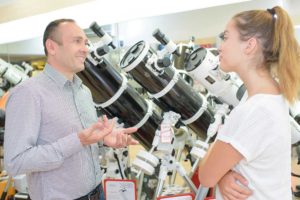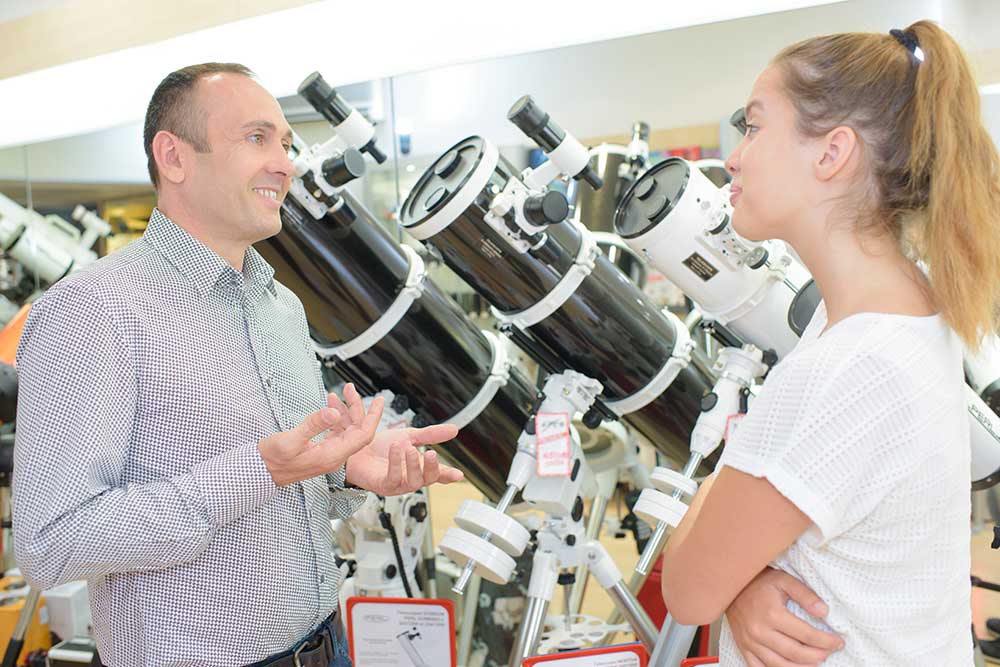Disclaimer: The information on our website is provided for general information purposes only. We make no representations or warranties of any kind, express or implied, about the completeness, accuracy, reliability, suitability or availability with respect to the website or the information contained on our website for any purpose. Any reliance on such information is therefore strictly at your own risk and we are not liable for any damages or losses arising out of or resulting from your reliance on any information contained on our website.
An astronomer is a scientist who studies the universe. In fact, their key role is to study stars, planets, moons, celestial objects, and other galaxies. However, they may also come up with theories that support some of their observations of the sky. Astronomers can also specialize in planetary astronomy, galactic astronomy, or physical cosmology and their primary work is done in laboratories or observatories.
Watch the next video to learn what types of projects NASA astronomer Carrie Anderson works on.
How to Become an Astronomer

Becoming an astronomer is a rewarding but demanding journey that requires dedication and a passion for the cosmos. In fact, after completing a bachelor’s degree with a foundation in physics or a related science field they keep going. That’s because pursuing a master’s degree is the next step into specialized areas of astronomy to gain valuable research experience.
The ultimate goal for many is to attain a Ph.D. in astronomy or a closely related field. During this rigorous doctoral program, students conduct original research, contributing to our understanding of celestial bodies and phenomena. Also, it’s worth noting that this journey, from undergraduate studies to a Ph.D. is not short. Typically, students spend 7-9 years on their education, which reflects the dedication required to become an expert in this field.
Astronomy is a multidisciplinary science, encompassing not only the study of planets, stars, moons, and galaxies but also the broader universe. To prepare for this career, aspiring astronomers should expect to immerse themselves in courses that cover a wide range of topics, from astrophysics to planetary science. Additionally, some graduate programs may include managerial and research classes to equip future astronomers with the skills needed to lead and conduct cutting-edge research in this awe-inspiring field.
Job Description of an Astronomer
Astronomers are involved in the study of galaxies, stars, and planets using telescopes and even space-based equipment. Some astronomers may explore objects in the solar system while others study the origin of the universe, the nature of time, black holes, neutron stars, or other galaxies. They can also conduct scientific experiments to test theories and discover properties of energy and matter. Astronomers also gather data from mathematical calculations to analyze information that may point to the existence of planets in distant solar systems. The following video provides more information into this exciting career field.
Student Astronomy Resources
If you are interested in Astronomy, you may like the WorldWide Telescope also, NASA’s TV channel is interesting and it’s easy to access online.
Astronomer Career Video Transcript
Physicists and astronomers explore the dimensions of the universe… from the vastness of intergalactic space… to minute subatomic particles. They study the ways different forms of matter and energy interact. Physicists explore the laws that govern space and time. They may focus on theoretical areas like how the universe was formed, or take a more practical direction such as developing laser surgery technology.
Astronomers study planets, stars, and other celestial bodies. Using telescopes and space-based equipment, their research may examine our own solar system, or aim at distant galaxies. Most physicists and astronomers work full time, often on teams with engineers and other scientists. They are employed by higher education institutions, scientific research and development organizations, and the federal government— especially NASA and the Department of Defense. Some need to apply for research grants to fund their work. Astronomers and physicists do most of their work in offices. Astronomers visit observatories occasionally as data from observations has become widely available via the Internet.
Some physics experiments require particle accelerators or nuclear reactors, but most research is conducted in smaller laboratories. Research and academic positions require a Ph.D. A master’s degree qualifies candidates for most positions in manufacturing and healthcare. The Federal government employs scientists with degrees ranging from a bachelor’s to a Ph.D., depending on the position and agency.
Article Citation
Bureau of Labor Statistics, U.S. Department of Labor, Occupational Outlook Handbook, Physicists and Astronomers.
The career video is in the public domain from the U. S. Department of Labor, Employment and Training Administration.

